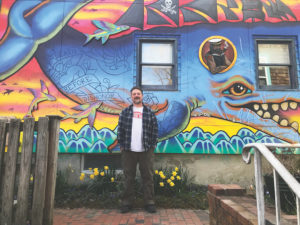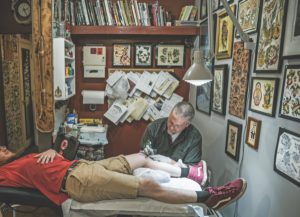At the end of Bob Gasoi Memorial Art Alley, at 290 Commercial St. in Provincetown, as you descend the stairs to Coastline Tattoo’s small, underground shop, you enter an otherworld of colorful designs, ink bottles, and artists bent over partially exposed bodies. In one corner of the workspace, the tattoo artist Ephy Kurucz sits in a red apron, ready to create her first tattoo of the day.
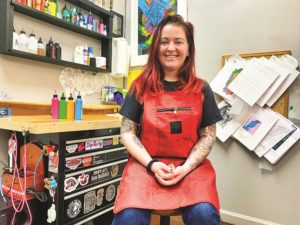
When she visited Provincetown in 2015, Kurucz, a recent B.F.A. graduate from Grand Valley State University in Michigan, had no intention of becoming a tattoo artist. Then she met Coastline owner Kris Smith through mutual friends. Smith says he was so impressed by “her personal style and the attention to detail in her pen and ink portrait work” that he offered her an apprenticeship on the spot.
Kurucz accepted. A month later, she moved to the Outer Cape and began to work with Smith. “I thought, why not try it out?” she says. “Provincetown felt to me like a pirate hideaway with a magical collection of humans and a sewer of bizarre things. Different, unique places attract me because I’ve always lived out of the norm, myself. I feel very lucky to be where I am.”
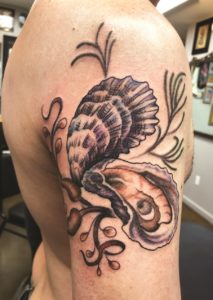
Kurucz is now one of three artists on Coastline’s year-round team. “My apprenticeship ended in 2018, meaning I met all the requirements of the board of health and was a fully licensed tattoo artist going into 2019,” Kurucz says.
Smith values Kurucz’s “relaxed and confident approach to her artwork and clients, and her daily dedication to make it happen,” he says. “It takes hard work and perseverance to make a living as a working artist, let alone a tattooer.”
Kurucz emphatically asserts that tattoo art is as challenging as traditional art. “Tattooing requires you to draw and paint in a wide variety of styles, all day, every day, whether it’s a design on paper or the tattoo itself on skin,” she says. “If you work hard and you’re diligent, you’re constantly honing your skills.”
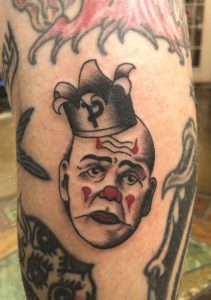
She feels that tattoo artists are increasingly respected in the art community, in the same way that having a tattoo is becoming more acceptable. “When I was younger, I was fascinated by tattoos, but they were still considered taboo and trashy,” Kurucz says. Tattoo artists now “interact with the whole spectrum of humanity. I often say: Why wouldn’t you hire somebody with tattoos? That shows that they can be tortured for hours!”
There are, of course, unique challenges to Kurucz’s medium. “I can’t take my human canvas, hang it in a gallery, and sell it for hundreds of thousands of dollars,” she says. “Tattoos age, change, and deteriorate over time. They are not an investment, like, say, buying a Warhol.” Kurucz feels, though, that the gap between traditional artists and tattoo artists is closing. “Tattoo artists are also putting on gallery shows and selling their drawings and paintings.”
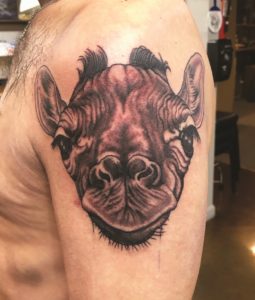
In her designs, Kurucz tries to blend traditional tattoo styles with ideas she develops, inspired by, among others, the late great tattoo artist Thom deVita. “He was doing unique tattooing in New York City in the ’70s, ’80s, and ’90s, when tattoos were clandestine and illegal — mixing styles, layering and expanding the boundaries of what tattooing could be,” Kurucz says. “His shop was not the standard walk in and pick something off the wall.”
Kurucz honors the work of tattoo artists she admires by offering them her own body as a canvas. She currently has between 30 and 40 tattoos. “I’ll either choose from their pre-drawn designs, if there’s an image I like, or I’ll ask them to draw me something inspired by a funny story. Sometimes, I’ll ask for a specific image because I want to take on the characteristics of that image — strength, courage, etc. But I always give the artist the freedom to draw the tattoo how they want to. What I’m looking for, most importantly, is for them to do their thing.”
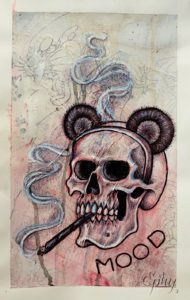
In her own practice, Kurucz focuses on the connection she creates with her customer. “We are working together to create a design we’re both happy with and agree on,” she says. “The tattoo is only going to be as good as I am, so I try my best to show up as mentally and physically prepared as possible.” Likewise, she adds, “if my client is not mentally and physically prepared, then they might not get my best work. It’s a collaboration.”
Kurucz offers her customers advice on the style and location of a tattoo, but ultimately respects the wishes of the people who will carry her art on their body. “I know that, regardless of how I feel about it, this tattoo is important and means something to this person, and I want to validate that,” she says. “I want them to walk away feeling good. My own tattoos make me feel more like myself and more confident, and I want the same for my customers.”
